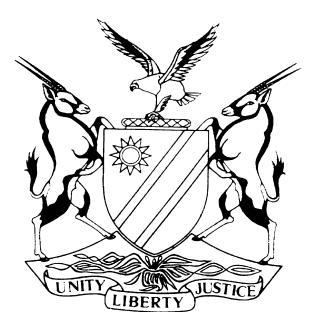NOT REPORTABLE

HIGH COURT OF NAMIBIA, MAIN DIVISION, WINDHOEK
JUDGMENT
Case no: I 2500/2008
In the matter between
STANDARD BANK NAMIBIA LIMITED AppliCANT
and
MARTIN LUCKY NAMUPOLO 1ST RESPONDENT
R ARANGIES T/A AUTO TECH 2ND RESPONDENT
TAXING MASTER: AR BEZUIDENHOUT N.O 3RD RESPONDENT
Case no: I 1351/2012
In the matter between:
STANDARD BANK NAMIBIA LIMITED AppliCANT
and
CHRISTELLE HARTZENBERG 1ST RESPONDENT
AUTO TECH PANELBEATER CC 2ND RESPONDENT
RAINER ARANGIES 3RD RESPONDENT
TAXING MASTER: AR BEZUIDENHOUT N.O 4TH RESPONDENT
Neutral citation: Standard Bank Namibia Limited v Martin Lucky Amupolo (I 2500/2008: I 1351/2012) [2017] NAHCMD 66 (8 March 2017)
CORAM: MILLER AJ
Heard: 3 October 2016
Delivered: 8 March 2017
ORDER
1. The only order that I am prepared to grant is that the Taxing Master was not entitled to issue the directions he made prior to the taxation of the Bill itself. To that limited extent, the applicant was the successful party to the proceedings.
2. In case I2500/2008, the second respondent is ordered to pay the costs of the application on the basis of one instructing and two instructed counsel.
3. In case I 1351/2012, the first respondent is ordered to pay the costs of the application on the basis of one instructing and two instructed counsel.
JUDGMENT
_________________________________________________________________________
MILLER AJ;
[1] This is an application in terms of which a declarator is sought against the Taxing Master’s finding that the costs scale as between attorney and client is not the same as the costs scale as between attorney and own client.
Brief Background
[2] The applicant is the plaintiff in the action instituted by Standard Bank Namibia, under case number I 2500/2008 (the first action) and it was also the plaintiff in the action instituted by Standard Bank Namibia Limited under case number I1351/201 (the second action).
[3] In short, the applicant obtained three Court orders in its favour (the first being an adverse cost order against the second respondent in the first action granted on 1 February 2012. The second being the one for the 29th November 2012 against the second respondent when its appeal was dismissed, and the third one being a cost order against the first respondent in the second action, granted on 23 October 2013). All three orders were scheduled to be taxed on the 3rd of April 2014. The adverse cost orders were against the second respondent in the first action and the first respondent in the second action. In these orders, the second respondent and the first respondent were ordered to pay the applicant’s costs of suit on the attorney-and-own-client scale. The Order of the 29th of November was against the second respondent, however it was on the ordinary scale, the party and party scale.
[4] Before the commencement of the taxation on 3rd April 2014, the legal practitioner who represented the second respondent indicated that he has, in principle, an objection to all the bills of costs regarding the tariff as between attorney and own client.
[5] It is apparent from the pleadings that the parties agreed to approach the Taxing Master to advise accordingly on what attorney and own client costs entail and for the Taxing Master to first make a ruling on that issue after they have given written submissions.
[6] The 4th respondent in his answering affidavit submits that his understanding of and ruling on the attorney-and-own-client scale was that it was in effect similar to the attorney-and-client-scale and that he taxed the parties’ costs along his understanding. I now move over to the issue to be decided.
[7] The Court is asked to make a ruling on whether attorney and client costs is the same as attorney and own client.
[8] For the reasons that follow, it is not necessary to determine this issue at this stage.
[9] The Taxing Master is a creature of statute and can only act within the limits of the empowering legislation. Rule 70 of the Uniform rules of Court does not afford the Taxing Master a discretion to determine what scale should be employed in the taxing of a bill of costs. It is not competent for the Taxing Master to make a ruling on what scale costs should be taxed, his task is confined to taxing the Bill of Costs presented to him. In the event that either of the parties is not satisfied with the taxation of the Bill, the matter should be referred to the Court to review the taxation.
[10] In light thereof, the matter before me is premature and not in accordance with the required procedures which are applicable.
[11] In my view, the review sought by the applicant was likewise premature and cannot be granted in accordance with the form in which it was formulated. The only order that I am prepared to grant is that the Taxing Master was not entitled to issue the directions he made prior to the taxation of the Bill itself. To that limited extent, the applicant was the successful party to the proceedings.
[12] As far as costs are concerned, the following orders are made:
1. In case I2500/2008, the second respondent is ordered to pay the costs of the application on the basis of one instructing and two instructed counsel.
2. In case I 1351/2012, the first respondent is ordered to pay the costs of the application on the basis of one instructing and two instructed counsel.
____________________
PJ Miller
APPEARANCES:
For the Applicant: R. TOTEMEYER S.C (with him B. de Jager)
Instructed by: Behrens & Pfeifer, Windhoek
For the Respondents: T.A. BARNARD
Instructed by: Mueller Legal Practitioners